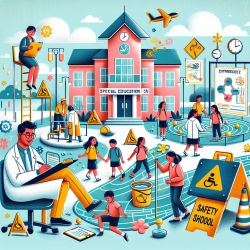Introduction
As practitioners in the field of speech-language pathology, our mission is to improve communication outcomes for children through evidence-based practices. While our focus is on communication disorders, insights from other health domains can provide valuable lessons. The study titled A Qualitative Study on the Perspectives of Latinas Enrolled in a Diabetes Prevention Program: Is the Cost of Prevention Too High? offers such insights. This research highlights the importance of readiness to change, family dynamics, and social support, which are crucial for successful intervention outcomes in any field, including ours.
Understanding Readiness to Change
The concept of readiness to change (RTC) is central to the transtheoretical model of behavior change, which suggests that individuals progress through stages before adopting new behaviors. The study found that Latinas' readiness to engage in preventive behaviors varied significantly, impacting their success in diabetes prevention programs. For speech-language pathologists, assessing a child's and family's readiness to engage in therapy can be pivotal. It may determine the timing and approach of interventions, ensuring they are more effective and tailored to the individual needs of the child and family.
Family Dynamics and Support
Family dynamics play a critical role in the adoption and maintenance of new behaviors. The study revealed that Latinas often faced barriers due to family resistance to change, highlighting the need for family involvement in interventions. In speech-language pathology, involving family members in the therapeutic process can enhance outcomes. Encouraging family participation and addressing potential resistance can create a supportive environment that fosters communication development in children.
The Role of Social Support
Social support was identified as a key factor in the success of behavior change among Latinas. This finding underscores the importance of creating a supportive network for children undergoing speech therapy. Practitioners can facilitate peer support groups or connect families with similar experiences to build a community of encouragement and shared learning. This approach not only supports the child but also empowers families to continue the progress outside of therapy sessions.
Practical Implications for Practitioners
- Assess Readiness: Evaluate the readiness of both the child and family to engage in therapy. Tailor interventions to match their stage of readiness to enhance effectiveness.
- Involve Families: Actively involve family members in the therapeutic process. Educate them on the importance of their role and address any potential resistance to change.
- Foster Social Support: Create opportunities for families to connect and support each other. Consider organizing group sessions or online forums for shared experiences and encouragement.
Encouraging Further Research
The study emphasizes the need for further research on factors influencing readiness to change and the role of social determinants in health outcomes. Speech-language pathologists can contribute to this body of research by exploring these factors in the context of communication disorders. Understanding how readiness and social support impact therapy outcomes can lead to more effective interventions and improved communication skills in children.
To read the original research paper, please follow this link: A Qualitative Study on the Perspectives of Latinas Enrolled in a Diabetes Prevention Program: Is the Cost of Prevention Too High?










